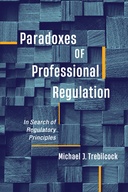Explore

Paradoxes of Professional Regulation
0 Ungluers have
Faved this Work
Login to Fave
Occupational licensure, including regulation of the professions, dates back to the medieval period. While the guilds that performed this regulatory function have long since vanished, professional regulation continues to this day. For instance, in the United States, 22 per cent of American workers must hold licenses simply to do their jobs. While long-established professions have more settled regulatory paradigms, the case studies in Paradoxes of Professional Regulation explore other professions, taking note of incompetent services and the serious risks they pose to the physical, mental, or emotional health, financial well-being, or legal status of uninformed consumers. Michael J. Trebilcock examines five case studies of the regulation of diverse professions, including alternative medicine, mental health care provision, financial planning, immigration consulting, and legal services. Noting the widely divergent approaches to the regulation of the same professions across different jurisdictions – paradoxes of professional regulation – the book is an attempt to develop a set of regulatory principles for the future. In its comparative approach, Paradoxes of Professional Regulation gets at the heart of the tensions influencing the regulatory landscape, and works toward practical lessons for bringing greater coherence to the way in which professions are regulated.
This book is included in DOAB.
Why read this book? Have your say.
You must be logged in to comment.
Rights Information
Are you the author or publisher of this work? If so, you can claim it as yours by registering as an Unglue.it rights holder.Downloads
This work has been downloaded 32 times via unglue.it ebook links.
- 32 - pdf (CC BY-NC-ND) at Unglue.it.
Keywords
- Economics
- Economics, finance, business & management
- Macroeconomics
- monetary economics
Editions

